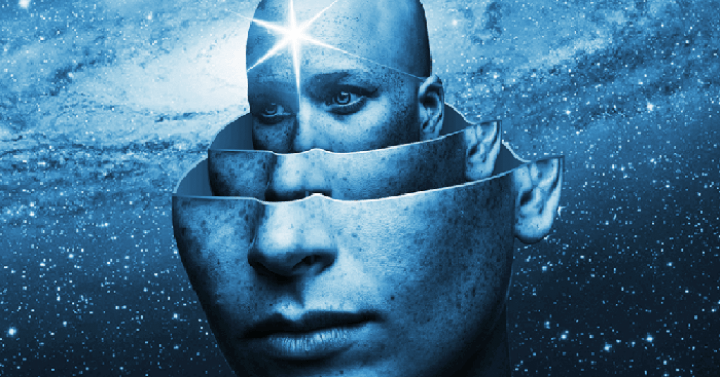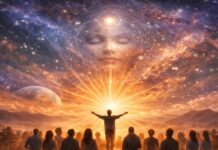
By Giovanni Dienstmann on Sunday January 1st, 2017
Finding The True Path To Liberation
Buddhist monks, Hindu yogis, modern spiritual teachers, and Burning Man enthusiasts all use the term “spiritual enlightenment” – but are they speaking about the same thing?
In this article I will explore what spiritual enlightenment is, both the traditional definition as well as the modern interpretation. There is no consensus around this topic, and it’s an area of intense metaphysical debate.
My purpose here is to eliminate some misconceptions, and to discuss the optimal attitudes to develop in relation to this lofty goal.
 The term enlightenment has different traditional and modern interpretations.
The term enlightenment has different traditional and modern interpretations.The Traditional Definition
The traditional concept of enlightenment comes from the spiritual traditions of India – notably the various schools of Yoga, Vedanta and Buddhism – and denotes the highest state of spiritual attainment. The end of the path.
Some of the synonyms for enlightenment, given by different schools of thought, are:
- Buddhism — Nirvana, Liberation, Awakening, Cessation
- Yoga — Liberation (moksha, mukti), Realization, Release, Aloneness (kaivalya), Union (yoga), Perfection (poorna)
- Vedanta — Self-realization, Self-knowledge, Jnana
 The concept of enlightenment comes from the spiritual traditions of India.
The concept of enlightenment comes from the spiritual traditions of India.The Root of Enlightenment
All these traditions have several points of disagreement when it comes to defining the “metaphysical nature” of enlightenment. However, at their root they all seem to agree on at least three points:
- It is permanent (cannot be lost once attained)
- It involves transcending the ego
- It is the end of all forms of suffering
As you can see, the bar is high.
There are similarities between this concept and what is called Salvation or the “Kingdom of God” in Christian Mysticism, and “Union with God” in Sufism, but exploring those is beyond the scope of this article.
 Enlightenment has roots in many traditions like Buddhism, Christianity and Sufism.
Enlightenment has roots in many traditions like Buddhism, Christianity and Sufism.Modern Conceptions
According to the Bhagavad Gita, only one in a billion people “knows the Truth”, that is, is Enlightened. Yet, nowadays there are many people who judge themselves to be enlightened. That being the case, for 99% of those people, one of the following is true:
- (a) They believe to be more advanced on the path than they actually are.
- (b) They postulate different levels of enlightenment, calling the traditional definition “full enlightenment”, and place themselves somewhere in that scale.
- (c) They consider the traditional definition of enlightenment to be mythical, exaggerated, or impossible. Unable to fathom even how to reach it, they redefine liberation according to their level of experience.
There will always be people in category “a”, and I’m not so worried about that. The ego is a master of deceit, and it can clock itself in spirituality too.
 People tend to redefine enlightenment to suit their own spiritual journey.
People tend to redefine enlightenment to suit their own spiritual journey.The True Awakening
I also have no problem with category “b”, although I find it potentially confusing and misleading to name certain stages of the way as “enlightenment” when they don’t actually meet the traditional standards defined for this state (as per Hindu and Buddhist references).
There are levels of experience. There are no levels of Realization. – Ramana Maharshi (paraphrased)
There are many milestones on the way, after which deep and permanent transformations happen, and a lot of the possibility of future suffering simply drops away. I speak of this from having observed several teachers, and also from my own personal experience. These milestones are better called “awakening” – and there are many awakenings before final enlightenment/liberation.
 There are many awakenings on the way before you reach final enlightenment.
There are many awakenings on the way before you reach final enlightenment.Distorting The Meaning
Moving on, the real problem is people in category “c”. They are distorting the essential meaning of enlightenment. Perhaps they confuse certain awakenings along the way with full liberation, judging themselves to be enlightened.
In order to “make that work” for themselves, they need to redefine enlightenment in softer terms, so that it matches their level. And then, because there is obviously a lot of work still ahead for them, they either say that “enlightenment is a step in the journey and not the end of it” or they pretend that all which is still lacking is not important (like most neo-advaitins).
I don’t mean to say that everyone that claims to be enlightened is being deceitful – nor does it mean that they are not effective spiritual teachers. But, if they do not meet the “traditional requirements”, it seems to me they are either lacking humility or self-awareness. Or else they should use another word to describe their experience/state.
 The essential meaning of enlightenment gets distorted in modern times.
The essential meaning of enlightenment gets distorted in modern times.The True Nature of Reality
Looking on the bright side, however, even such watering down of enlightenment is beneficial for some people, since it makes it feel more achievable. With that comes increased motivation and dedication to spiritual practice.
Still, one can get that benefit without distorting the initial teaching.
Many of the traditions agree that enlightenment is already here and now, and that it is our true nature – or the true nature of reality. It is not that we have to achieve it or become it, but rather we need to remove the obstacles to its expression.
 The only obstacles on your path are the ones you put there yourself.
The only obstacles on your path are the ones you put there yourself.Sudden vs Gradual Path
Some teachings regard liberation as a goal, something to be consciously and methodically worked towards. They emphasize the need to transform and purify the mind – or even transcend it altogether – through practices such as meditation, spiritual study, ethics, devotion, etc. We can call this the gradual approach.
Other traditions prefer to emphasize the “already present” aspect of enlightenment, and then center the teachings more around inquiring into your true nature and simply living in the present with non-attachment. We can call this the sudden approach.
A combination of practices seems more desirable. Or at least being aware of the traps of your particular approach. The seeker in a gradual path can also cultivate the feeling that everything is perfect here and now, and that the true nature is always accessible. Conversely, the seeker on a sudden path can cultivate the practices and mental qualities of the “slow approach”, and contemplate the truth of sudden enlightenment, gradual cultivation.
 Traditions teach different ways to reach enlightenment that are both sudden and gradual.
Traditions teach different ways to reach enlightenment that are both sudden and gradual.A Direction, Not a Goal
Full enlightenment is possible, and is not only for monks. However, it is extremely rare. I believe that at any time in the world there are probably less than a hundred people in that peak of achievement.
When this truth becomes clear about how elusive and rare full enlightenment is, many people feel discouraged, frustrated, or demotivated. The amount of effort involved is so great, and the time requirements are so considerable, that many just conclude that “enlightenment is not for me; I could never practice like those masters”. For most people, seeking it obsessively is actually a source of suffering.
All of these issues happen when we take enlightenment as a hard goal, and cling to it. And these problems all disappear the moment we make a small tweak in our mindset.
 Do not become discouraged by how rare it seems to find full enlightenment.
Do not become discouraged by how rare it seems to find full enlightenment.A Mindset Tweak
What is this tweak? To look at enlightenment as a direction, rather than a goal.
A goal is not always meant to be reached. It often serves simply as something to aim at. – Bruce Lee
This attitude also prevents the following problems: (a) feeling that you are not good enough, or worthy; (b) feeling frustrated with the slowness of your progress or the size of the road ahead; (c) wanting to give up; (d) watering down the original concept of enlightenment.
Once you regard it as a direction, you are much softer about it. You are able to better enjoy the path itself, without anxiety, and to grow towards liberation in a more organic way. It also becomes less likely that your spiritual search will negatively interfere with other aspects of your life.
 Walk the path towards liberation by seeing enlightenment as a direction, not a goal.
Walk the path towards liberation by seeing enlightenment as a direction, not a goal.Putting Things in Perspective
In many traditions, the teachings are quite binary: you are either ignorant, or enlightened. However, since enlightenment is so rare and elevated, this way of seeing things can often be unhelpful. There are a thousand important milestones that can happen before full enlightenment, and many of these are life-changing. Acknowledging these “mini-awakenings” can help keep the seeker motivated and on track.
The advanced Yogis, monks and masters that we may compare ourselves to are in the peak of their path. They are like the Olympic athletes of meditation. Many of us are only serious amateurs, aficionados, or semi-professionals. Very few people will practice like those masters. But everyone – you included – can practice a little, and with time enjoy a much happier, more peaceful, and more meaningful life.
Of course, we can and ought to look up to those that completely embody the state of liberation, for the purpose of being inspired to walk in that direction. But this ceases to be helpful once it turns into a self-degrading comparison.
 Do not compare yourself to others but keep an open view of your own journey.
Do not compare yourself to others but keep an open view of your own journey.Enjoying the Path
The spiritual path exists so we can free ourselves from suffering. So we can find true peace, love, wisdom, meaning. So we can live a deep life, a life of truth. So let us learn to follow this path and grow in it in a gentle way – without violence towards ourselves (or others), for it defeats the purpose.
Let us learn to enjoy the path itself. Then there will be no sacrifice. No struggle. Only the natural expansion of consciousness.
If you force a child to grow up quickly and abandon all her toys, this will not be effective. Even if she grows up quicker than usual, she will resent this growth, and hold secret attachments to the toys that were given up prematurely.
 Learn to enjoy the spiritual path and let go of struggle.
Learn to enjoy the spiritual path and let go of struggle.Growing Organically
If instead you simply facilitate her growth, a moment comes when the child feels like giving up those toys of her own accord. This is organic growth – painless, natural, and timely.
This type of growth is hindered when we try to compare ourselves to others on the spiritual path, pretend to be ahead of where we actually are, or cling hard to the ultimate goal. So let us avoid that trap and focus on the journey right now, where we actually are, one step at a time.
With time, as our practice deepens, there will be a sense of joy, peace, and freedom that comes from your spiritual practice that is unlike anything you can experience elsewhere. When that starts to happen… then whether it still takes you 5 months, 5 decades, or 5 lifetimes to achieve enlightenment, it won’t matter much. You are happy and well, in your unique place in the universe, and nothing else matters.
 Take time to deepen your practice and allow your personal growth to develop organically.
Take time to deepen your practice and allow your personal growth to develop organically.Your Unique Path
The first signs of progress on the path of Yoga are perfect health, physical lightness, a luminous face, a beautiful voice, and freedom from craving. – Svetasvatara Upanishad
Not bad, I’d say.
For my side of things, I don’t practice 16 hours a day like monks do, nor do I follow the teachings perfectly. I meditate 2 hours per day, and try to follow the principles and practices during the day to the best of my ability. And I can tell you, from personal experience, that the fruits of the first steps in the path of Liberation are more valuable than anything the world can ever offer me.
Keeping this in mind, and Enlightenment as a North (rather than an obsessive goal), I keep on the path happily, knowing I’m doing the best thing I could do with my life. Whether enlightenment exists or not, whether it is possible for me or not – seeking it seems to lead to a good life.
 The path you take is your own journey and each step leads you to a happier life.
The path you take is your own journey and each step leads you to a happier life.Parting Thoughts
In a way, enlightenment and spiritual service is the goal and purpose of all my efforts. But from a more pragmatic perspective, I simply practice because I practice. I practice because it is the best way to live.
Let us spiritual seekers take enlightenment seriously, without changing the original meaning of this state – lest we diverge into sidetracks that only take us halfway up.
Let us take enlightenment as a direction, a North – and not a hard goal to cling on to. If enlightenment happens, that’s great. If not, let us walk with the conviction that even the first true steps in the path of liberation already bring more life benefits and superpowers than anything we can find in this world.
Source: http://upliftconnect.com/what-is-enlightenment-really/
Disclaimer: We at Prepare for Change (PFC) bring you information that is not offered by the mainstream news, and therefore may seem controversial. The opinions, views, statements, and/or information we present are not necessarily promoted, endorsed, espoused, or agreed to by Prepare for Change, its leadership Council, members, those who work with PFC, or those who read its content. However, they are hopefully provocative. Please use discernment! Use logical thinking, your own intuition and your own connection with Source, Spirit and Natural Laws to help you determine what is true and what is not. By sharing information and seeding dialogue, it is our goal to raise consciousness and awareness of higher truths to free us from enslavement of the matrix in this material realm.
Português
 EN
EN FR
FR


























Also, I think that this article is about spiritual tai chi, always moving with the forces and direct them towards a good outcome, using the force of the opponent in an almost playful game of life’s creation in endless varieties.
This quote is an appropriate comment on this beautiful article:
“For us, the attainment of non duality
is not the final destination
but rather a cantilever to greater mastery
and an understanding of how to create
benevolent outcomes.
Our perspective, as mentioned earlier
is that non-dual states of consciousness
are cantilevers to greater mastery of creation
and not the end point or goal of evulotion”
The Pleiadeians
Thank you very much. Victory of the light , love and peace forever more. Namasety.